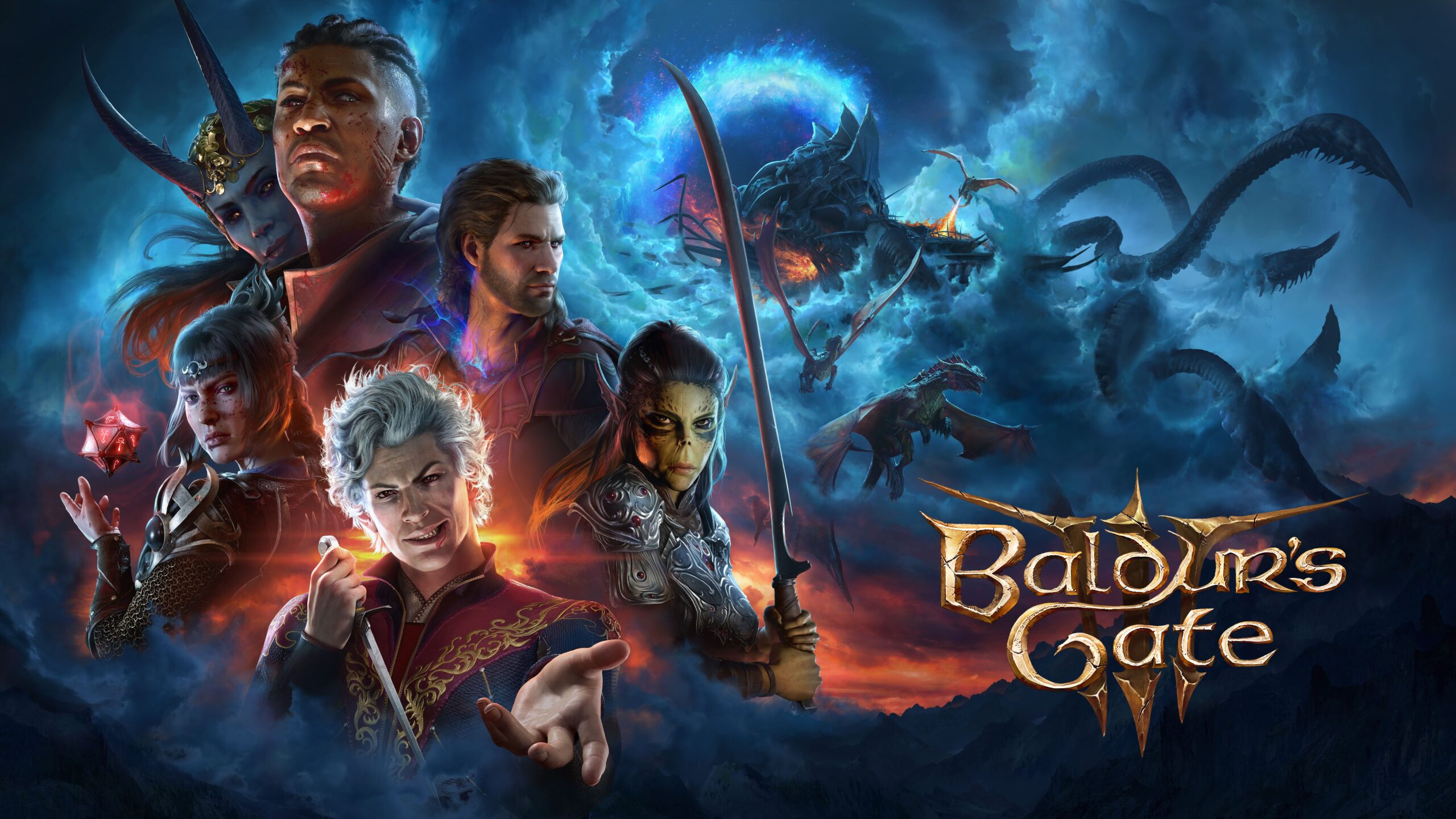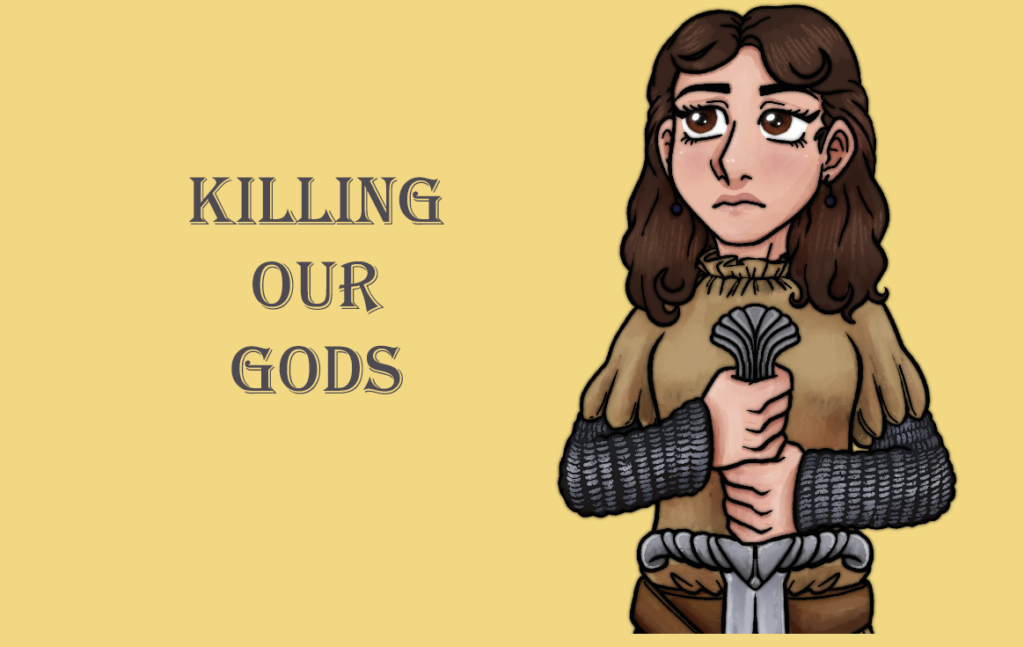
Killing Our Gods: When Tomorrow Comes
Killing Our Gods is a monthly column from Grace Benfell about Christianity, religion, and role-playing through a queer, Marxist, and lapsed Mormon lens.
I
The church is sterile, cold, exacting. Its hallways have the stale bright light of a dentist’s office. In and around curved operating tables, cloaked, uniformed men extract angels from the bodies they inhabit. They preserve the human from the inhuman. They drench the darkness in fluorescent lights. The choir that does not sing inspires silence.
However, within those bodies is something else. Not only the celestials that transform and move through memory. Not only the Conductor’s guiding hand, using souls like tools to cut out divine infection. Rather, what remains are the violet bloodstreams of memory. Alternate selves, moving like mirrorshards or lying shattered on the floor, speak in hallowed tongues. Memorized lessons gain killing life.
Within the faithful, there is something wild.
II
The churches of my youth looked like offices. The sickly green carpets and the endless folding chairs resembled school lobbies and auditoriums. The cold lights reflected off the tile in the men’s room. I was never a woman when I was there. The church was, in short, like every other place I went to. While it was in name different, and while I certainly felt different while I was there, in memory they feel like shades of the same creature. Hotel rooms in Southern Utah and my dad’s office brimming with books blur into windowless Sunday School classrooms and corkboard choked hallways.
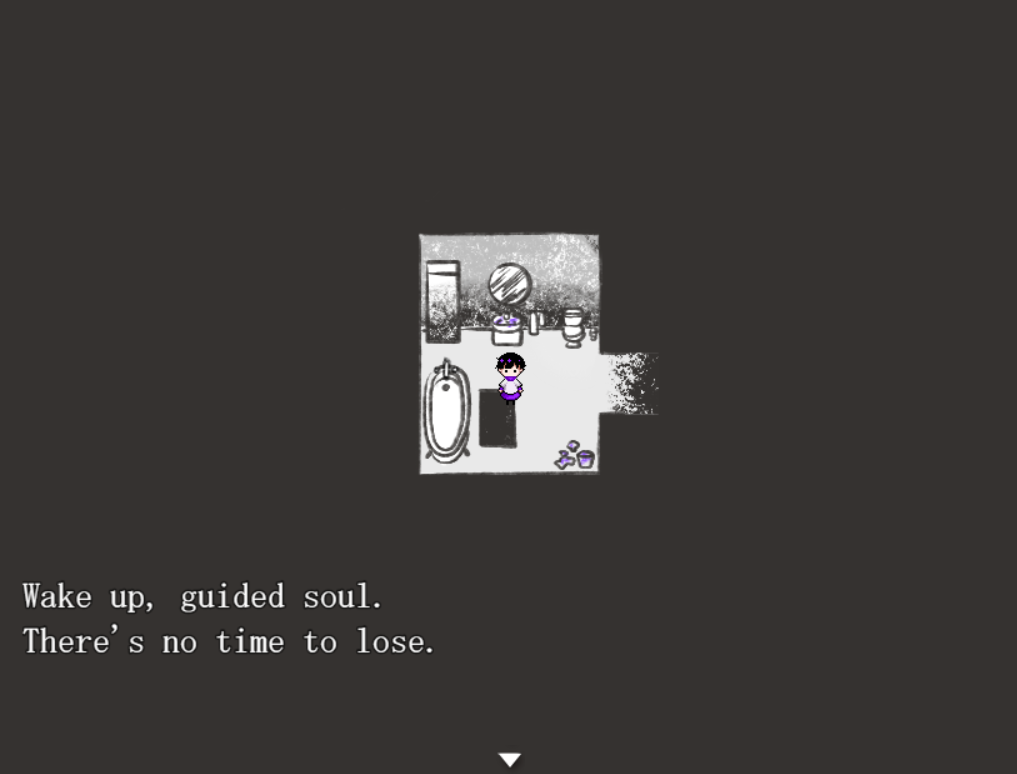
Queer culture, at least at its most digestible and mainstream, puts a lot of emphasis on “it gets better.” Once you are out, once you move to New York, once you get married, or have a boyfriend or really figure this gender thing out, then you’ll be on the other side of it. You’ll be free.
I don’t feel free. I don’t think most of my friends feel free either. The fact is, our lives are still lived in office space and desolate parking lots. As sanitized queer love becomes more palatable, my friends struggle for rent. As those in power throw thousands of dollars at capitalist ideas of queer family, my friends cannot pay for their transitions, or cannot start because of who they live with. While people post “you can just be a girl whenever you want,” I still struggle with believing myself, with seeing myself as a woman. We were all born into a nation and a culture that does not understand us, and cannot accommodate us except with wealth and “beauty.” My life refracts into endless, mirrored hallways, with sickly green carpet.
III
Etherane’s Tomorrow Won’t Come for Those Without ______ resists summary or classification, as its blank title might suggest. The two main characters, Remi and Orifiel wander an eerie hotel. Each hallway has a violet door, with an inscription, “tomorrow won’t come with a friend or a rosary or ______.” Each door opening requires obedience. Ori is more than willing to provide. He listens to the clear chirped instructions from his rosary. Remi, a friend to the spiritual and the ambiguous, follows Ori reluctantly, frightened and intrigued by his straightforward, smiling air.
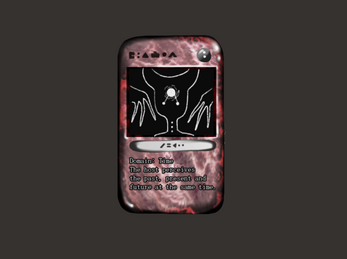
Because Ori is a member of the aforementioned Choir, and Remi an outsider, it would be easy to read twc* as a story about faith coming into contact with opposition. It is and it isn’t. Ori speaks of the Choir with scientific exactness. He does not talk about faith, but truth. He once reveals, in fact, that the Choir forbids the word “God,” though it still uses religion’s icons. His rosary is not a set of beads given devout meaning, rather a FitBit for the holy, notifications and reminders of what must be done. Remi, in contrast, has a reverence for the celestials. He is bewildered by the simplistic lessons of the Choir, showcased in puzzles required to move through the hotel. From the beginning, Remi’s identity is put into question; he may just be something other than human.
As Etherane put it, “the definitions of religion and philosophy in this story are switched.” The knowledge and understanding of the natural world and the inhuman are cloaked in the language of the occult and the celestial. The language of conformity and organized religion is wielded by scientists who wear the robes of priests. While Tomorrow Won’t Come For Those Without ______ has clear and sharp thematic ground, its metaphors are prickly. There is no easy one to one reading. In some sense, it showcases how the shape of thought can move between subjects. The divisions we make between science and faith are sometimes as thin as hotel walls.
IV
We talk a lot about how the church scars us, but less about how it makes us, for both better and worse. While many queer people, including myself, tend to define ourselves against our religious pasts, they continue to shape our thoughts and feelings. The congregations we once visited are communities. Every gathering of LDS members has “fast offerings,” a small means of redistributing wealth to the hungry and needy. In those stale classrooms, our elders gave me honest answers to tough questions. I still receive emails informing that so-and-so is moving elsewhere and could use help getting their coach down the stairs or giving reminders of ways to volunteer locally. But among these people, power also creeps. Leadership conducts interviews behind closed doors. “In-active” members are spoken of in sharp whispers. Faith is always strong, always visible. Doubts remain behind. Some testify often, but others only sit and watch.
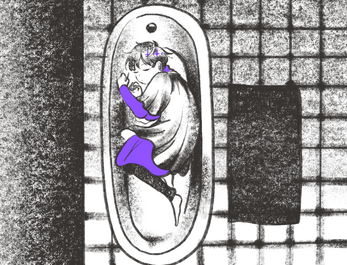
In turn, I have known ex-mormon and mormon queer people with boundless genorosity. They had a keen sense of whom to help and when. They had a fierce kindness that bit and scratched at the hardness of the world. I have also known ex-mormon and mormon queer people who are viciously punative. I have seen endless discussions on twitter about how queer members should leave or divest from the church, with very little example of how. I have seen those who would vigorously condemn giving money to church, advertise for investment platforms. I have seen people police gendered language, proclaim queerness and mormonism as static and unchangeable, condemn the violence of protests, or simply refuse to listen to other queer people’s perspectives. We trade one kind of punitive moral code for another.
I do not mean to condemn. Rather, I wish to emphasize that there is not one moment where we get free, but it takes millions of individual seconds to move forward. What that requires from us is not smugness or denial but awareness. We are still, in part, formed by what we were. We are trying “to kill the cops in our heads” as several of my friends would put it. But they are resilient, and we can only cut, not outright kill.
We are still trying to free ourselves from ourselves.
V
Towards the end of the hotel, Remi and Ori come across a massive statue. To Remi, it appears as the form of one of the celestials, its eyes(?) cut with dozens of tiny spears. To Ori , it appears to be a giant statue of Remi. As soon as he reaches to touch it, this stone Remi shatters and begins to cry stone tears. After a moment of distress, Ori shrugs it off. If it is broken it is meant to be broken. Even though Remi bristles at Ori’s conclusion, in some sense he believes it to be true. In one of the game’s endings, when Remi dissolves, begins to turn into something else, he grimaces in familiarity. Of course this would happen, he thinks. This is what I am.
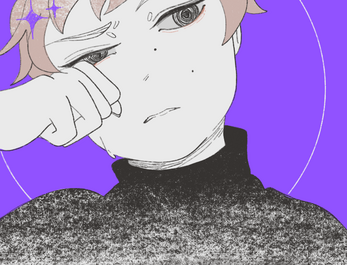
Ori, though, is not also not as he seems. His easy going nature is a front, insisted on by his sister Mari to help him through the harsh world of the Choir. Though he has been pushing through every gateway, he cries at a moment of vulnerability, “I don’t want tomorrow to come.” As my friend Charlotte pointed out, these people are not just shells of ideology, they are moving through systems that refuse or cannot acknowledge their complexities.
Also, though, those systems are part of them. Through the celestials, Tomorrow Won’t Come Without ____ explores the way our bodies reach beyond our frames. What is a human without dust or air or water? How can we define ourselves without the homes in which we have lived or the food that we have eaten? Tomorrow Won’t Come Without ____ forces us through hallway after hallway, because it knows that those repetitions are the things we are made of.
The celestials are another one of the game’s prickly metaphors. However they represent, in part, the things about ourselves that we cannot change. They give form into the natural things that seep into our body, or the way our bodies change with stress and trauma. The celestials inhabit bodies where, as Ori says, there are holes, absences. However, separating them from their human hosts will not provide purity or wholeness, as the Conductor of the Choir would claim. Instead it is that separation that breaks us. And it is that brokenness that is later proclaimed to be natural.
VI
What were my most holy days? The days where I felt my violet veins, felt my blood and my skin, felt the sun?
They were days when it felt like tomorrow would never come.
VII
When Ori was a child, his sister Mari led him through the forest. Mari would narrate as Ori acted it out. It was of unknown creatures in the dark. They would lose track of time, fallen into stories. In one end, Ori tells this story again to Remi, all three of them wander the forest together.
“Only we would remember the lie we told each other.”
Notably, it is a lie but it is not a deception. To tell a lie, you have to know the truth. Both Ori and Remi know that they will never be in the forest together. They know where they are and what is happening. But they choose to tell each other something else, for a moment. Though they are telling lies, it is when Remi and Ori are being most honest with each other, about who they are and what they want.
Tomorrow Won’t Come for Those Without _____ is a bleak game. Even in its lighter moments, violence hovers at its edges. It is fitting that the game’s articulation of an alternate, better situation for these characters is whispered in bathtubs, huddled in dark rooms, draped in lies. There is, though, such honesty in that. Religious trauma is difficult to escape. God has marked every person lost to it. It’s not a battle that is easy or clean or frees us once we leave. It’s not something that can be cured with science or with simple defiance. It requires nothing short of revolution.
But in the meantime, we have to live, we have to change, we have to make something of our pieces. So we huddle with our memories. We cling to each other and tell lies in the dark.





